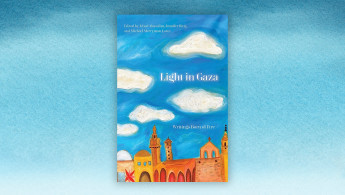Light in Gaza: Palestinian anthology permeates a permanence
Israel has normalised Gaza’s gradual annihilation through its bombing of the enclave, which only makes it to mainstream media when the level of destruction is deemed newsworthy.
The distant narrative employed about Gaza renders Palestinians living there an abstract concept, further fuelled by the illegal blockade and near-complete closure, preventing travel and any semblance of a normal life.
Light in Gaza: Writings Born of Fire (Haymarket Books, 2022) makes Gaza tangible to the reader through a collection of writings by Palestinian authors, whose observations and experiences bring the stories of Palestinians to life, no longer abstract concepts buried under perfunctory reporting.
"Gaza is either spoken about in terms of Israel’s security narrative, as a humanitarian problem requiring a humanitarian paradigm, or as the epitome of Palestinian resistance"
In the introduction, one of the anthology’s editors, Jehad Abusalim, notes the existing barrier of understanding between Gaza and the outside world. “This intangible barrier becomes an extension of the physical barriers surrounding Gaza. As a result, Gaza is unrelatable and distant,” Jehad writes.
Jehad notes that Gaza is either spoken about in terms of Israel’s security narrative, as a humanitarian problem requiring a humanitarian paradigm, or as the epitome of Palestinian resistance.
Yet the conversation on Gaza by Palestinians themselves is missing. “The formal political framework maintained by the international community is no less violent than life on the ground in Palestine,” Jehad writes.
|
The anthology brings the reality of this statement to life. Through poetry and narrations of personal anecdotes and experiences, Gaza is presented to the reader as both relatable and contextualised.
The 1948 Nakba features prominently throughout the anthology – after all, Gaza has a predominantly refugee population. The writers in this anthology emphasise their original roots before Gaza and in doing so, open up an understanding for the reader as to how political injustice against Palestinians as a result of the ongoing Nakba contributes to the exclusion and incarceration of the enclave.
“Israel has killed a lot more civilians than freedom fighters,” Refaat Alareer states while noting that telling stories is one way of resistance. This is supported by Shahd Abusalama’s contribution who writes that Israel sees no civilians in Gaza. Shahd speaks out against neutrality’s hypocritical stance and the international community’s complicity with Israel, in terms of narrative and the latter’s exportation of its colonial violence through weapons technology.
Asmaa Abu Mezied writes of how the use of phones in Gaza is one form of combating the erasure which Israel inflicted on Palestinians: “We have learned the hard way that documenting what we are going through is very important to ensure that our narrative remains alive and remains ours.”
The insistence on Palestinian narratives is evident in this statement – too much of Palestine and Palestinians is narrated by external voices, while the space for Palestinian narratives is confined and needs to expand. Particularly in light of Israel’s continuous rewriting of history to eliminate documented proof of its colonial violence.
"The international community remains silent, expecting Palestinians in Gaza to do the same. This anthology is testimony that Palestinians will not be silenced, but space is needed for Palestinian voices to be heard. It is, indeed, a demand to stop colonising spaces to speak"
In another contribution, Abu Mezied writes of agrarian practices in Palestine and how these foster “place attachment” through the connection one feels with the land.
The writer traces the affinities back to folklore and the Palestinian peasant role in the 1936-1939 revolts during the British Mandate, while also noting that Israeli attacks on agricultural land in Palestine seek to disrupt this attachment, as well as Palestinian independence. “To return to the land is to revive that connection and challenge the exploitative practices that continue to harm our remaining biodiversity and threaten our cultural heritage.”
|
In the midst of the impermanence created by Israeli colonial violence, Palestinians seek permanence after destruction. Salem Al-Qudwa describes how the concept of home for Palestinians hovers between security and trepidation, which the humanitarian paradigm fails to note when constructing temporary dwellings for Palestinians in Gaza whose houses were destroyed by Israeli bombardments.
International architecture projects for Gaza lack the understanding of the enclave’s urban and societal fabric and note that humanitarian design requires more consciousness in terms of planning in relation to conflict and trauma.
Suhail Taha writes that the “so-called humanitarian aid is bound to serve the interests of those who nominally offer it to others.” Writing about electricity shortages in Gaza, Taha notes that the UN’s Sustainable Development Goals are far removed from Gaza’s reality, in which crisis is a permanent fixture.
Even if Gaza’s experience is not tangible to the rest of the world, its humanity is. Resisting through knowledge and literature, as Mosab Abu Toha explains, is imperative as Israel imposes restrictions on importing books and destroying bookstores. This is one part of Palestinian resistance that is rarely talked about.
Israel denies permits for medical interventions, yet the experience of Yousef AlJamal’s family shows the story behind the refusal.
The international community remains silent, expecting Palestinians in Gaza to do the same. This anthology is testimony that Palestinians will not be silenced, but space is needed for Palestinian voices to be heard. It is, indeed, a demand to stop colonising spaces to speak.
Ramona Wadi is an independent researcher, freelance journalist, book reviewer and blogger specialising in the struggle for memory in Chile and Palestine, colonial violence and the manipulation of international law.
Follow her on Twitter: @walzerscent


![Minnesota Tim Walz is working to court Muslim voters. [Getty]](/sites/default/files/styles/image_684x385/public/2169747529.jpeg?h=a5f2f23a&itok=b63Wif2V)






